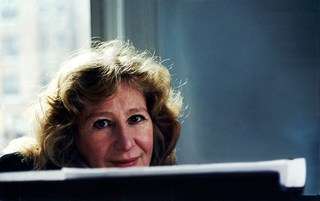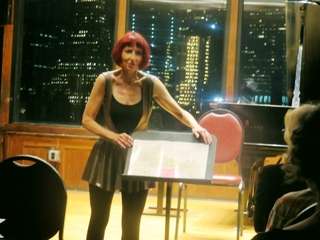|
Back
A Mainly Magnificent Seven New York
BargeMusic
08/30/2017 - & September 1, 2, 2017
“A Celebration of Contemporary Women Composers by Women Performers”
Laura Kaminsky: Fantasy for solo piano (New York Premiere)
Yoko Sato: The Road (New York Premiere)
Miya Masaoka: The Greenland Fjords for solo piano (World Premiere–graphic score based on 1933 Louise Boyd maps)
Dalit Warshaw: Selections from But Not Forgotten for soprano and piano (World Premiere)
Missy Mazzoli: A Thousand Tongues (World premiere of violin/piano duo)
Paola Prestini: The Phoenix for solo violin (Brooklyn premiere)
Alexandra du Bois: Fjord for solo piano (World premiere)
Nancy Allen Lundy (Soprano), Jennifer Choi (Violin), Yoko Reikano Kimura (Shamisen), Ursula Oppens, Dalit Warshaw, Kathleen Supove (Piano)

U. Oppens (© Courtesy of the Artist)
Were the Emerson Quartet to offer a concert including Schubert, Beethoven and Shostakovich, I would not have titled the review, “A Celebration of Men Composers by Men Performers.” But one can forgive BargeMusic for naming this concert “A Celebration of... Women Composers by Women Performers.” Outside of Hildegard von Bingen, Amy Beach and Clara Schumann, women simply didn’t figger much in music history.
Not until the last century and this century, when female writers have popped up from Iceland to Finland to Japan to the United States. And thankfully, as the BargeMusic septet of composers proved, there is certainly no “feminine style”. The septet here, and their genuinely superb interpreters, performed different works of magnetic intensity, cool drama, intricate forms and harking back to earlier times.
The only sheerly vocal works were provided by Davit Warshaw, who is not not not only an excellent pianist but had a fitting collaborator .The two songs she wrote here were given a stirring performance by soprano Nancy Allen Lundy. Ms. Warshaw might resent the comparison, but the first, “When I am dead, I will still love you” had the direct emotional romanticism of a Samuel Barber. And while Barber is not in favor these days, the quiet intensity of the line (aside from pyrotechnical singing in the middle) had some of Barber’s unashamed feeling. The second song, taken from four poems, was almost recited a happy American sprechtstimme by the soprano) with a delicious kick!
(I was especially impressed by the pianistic bird song added by the composer. She claims it came from birds in her garden while she was composer. Or perhaps she was just Messiaen around.)

J. Choi/M. Mazzoli (© Courtesy of the Artists)
Two works, both played by the always exhilarating Kathleen Supove, were unlike her usual explosive piano. Missy Mazzoli had written her A Thousand Tongues on a poem by Stephen Crane. (Though the lines could have been spoken by our Present Psychotic Leader: “Yes, I have a thousand tongues, and nine and ninety-nine lie.”). Without knowing that, the combination of electric violin and electric piano (Jennifer Choi and Ms. Supove) was again a surprise by the always unpredicable Ms. Mazzoli. On the surface, the two were playing a series of tremolos, of emotional cries and whispers without much upon which we could hang. Yet the very emotion, the never ending sounds and reverberations by both instruments was oh so touching.
Ms. Supove played two “Fjord” song by two different composers, The Greenland Fjords her typical whooshing around the inner strings, with rushing water sounds on the keyboard.

K. Supove (with Greeland fjord-map) (© Samuel A. Dog)
But for Alexandra du Bois’ Fjord, Ms. Supove played a work I could hardly imagine at this concert. Fjord could have been written by Borodin or Liadov, or even the non-salon Mussorgsky. It sounded totally Russian, the harmonies were conservative yet thunderous. I don’t know which fjord Ms. Du Bois had in mind (though I suppose the Russian Arctic has quite a few), but this was a 19th Century Tsarist homage...perhaps.
Time tomorrow to see if Ms. Du Bois is represented on YouTube. Perhaps as a respite from the more contemporary works, this one was a time trip to the St. Petersburg “Five” , and Ms. Supove again showed her versatility.
Two other solos showed enormous talent, but I was more obsessed by the performers than the music. Jennifer Choi is always a delight (though we had to wait for the end for her two pieces). The second work, Mazzoli’s A Thousand Tongues, as I mentioned, was superb. Paula Prestini’s The Phoenix was a sprightly work for solo violin, yet it was Mr. Choi’s suredness, her gorgeous tone, the fine edge rather than the composition itself.
The first work on the program was possibly the longest. Or at least felt the longest. I had heard Laura Kaminsky’s music before at BargeMusic, and found her piano pieces challenging, colorful, filled with energy. Last night, her Fantasy took the title far too literally and too long, and embraced far more material than a single movement should have.
Of course if Ursula Oppens performs, one never wonders about the composer. I would walk many miles (or at least take the F Train across the Brooklyn Bridge), to hear this musical miracle at work. And yes, her performances of Frederic Rzewski (who had written for her) are at the top. But nothing she essays is anything but brilliant.
Fantasy was a decent enough vehicle for the pianist. The opening overtones and harmonics on a three- and four-beat cell promised to my ears, more experiments with overtones, more augmentations of the opening notes. They were repeated on both ends of the keyboard, but in the meantime, composer Kaminsky added more and more and more material. She probably could have given a cohesive explanation, but I didn’t feel it. And each time Ms. Oppens turned over another page, I was praying (though one should never even hint this with the pianist) that it would be the last. I applaud Ms. Kaminsky’s inspiration, yet I could do with a bit less creativity and more construction.
Which is why the following work, Yoko Sato’s The Road came as a relief. How wondrous that in New York, a work for shamisen shouldn’t be “exotic” or alien. The instrument is simply one more tool in the composer’s arsenal.
The shamisen is an elementary three-string instrument for plucking, a neck as graceful as a lute, sound resembling a banjo. But when Yoko Reikano Kimura performed, one could have imagined the banjo resonance like a harp or a Segovia guitar.
The left hand running up and down the neck, a kind of wooden feather-duster playing the sound over the box, and one felt right at home. Composer Yoko Sato didn’t attempt tricks or non-shamisen sounds. Rather, we had a series of melodies, fitting harmonies, a few changes of rhythm.
Ms. Sato’s The Road was neither blatantly audacious or stridently innovative. It was a work of elegance, ingenuity and bewitching radiance.
Harry Rolnick
|